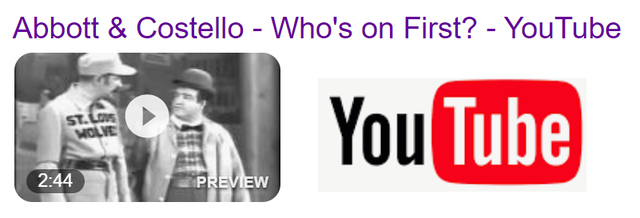 Well to be honest, after growing up with computers, using them through my high school and university career, having seen the rise of social media through my young adulthood, and now seeing the evolution of smartphones, and very immersive social media such as Snapchat and TikTok as an experienced teacher and parent of two adolescents, I truly feel like the lessons of digital citizenship and media literacy are like the Abbot and Costello skit of "Who's on first" (linked above - I recommend watching before reading on if you don't know the famous skit). Nobody knows who is teaching what, when, how or who, so I guess the 3rd baseman 'I don't know' is going to be in charge of teaching media literacy this year in art class. Without a curriculum or division wide focus on teaching media literacy, I really feell like the learning of students varies with each teacher (or parent) and their experience, comfort, background knowledge and passion to teach digital citizenship and media literacy. As a teacher and parent, I am comfortable with technology and eager to have youth learn about their digital identities, impact, accuracy of information and mindset online. And so I teach this in my homeroom class and social studies and when possible. This is not easy without a focused course on the subject as the materail must be woven into existing (often outdated) curriculums strategically, which involves comfort with both subject curriculum and teaching digital literacy. It really should be a course taught to all students (Digital Citizenship 8??) and then a unit in many social or english curriculums throughout high school. As Dr. Couros said in class, then we could have new teachers being trained to focus on this as an important topic for future citizens, because if it not a curriculum class then it is not a focus of the university and thus many teachers in public schools. So not only is media literacy and digital citizenship not really taught, it doesn't really look like it is going to be taught much differently in the future at this point. Saskatchewan has put out there comprehensive guide to digital citizenship education in schools and this is a wonderful resource from 2014. Unfortunately, I just don't see it being used at all in the high schools I have taught in or the professional development I have been a part of. My division has a web page dedicated to digital citizenship but really it is just full of links to the guide I just mentioned, Media Sense and the International Society for Technology in Education. So many resources and much information available but nothing really being done to actually teach the topic in schools. So at this point, it is almost totally up to teachers and schools to impart this information to students. I personally think all families should be aware of this shortcoming in public education. Parents would be wise to educate themselves and teach their children to be sure they are gaining the skills they need to be proper digital citizens with strong online media literacy skills. As this weeks group presented, so much of the information we obtain is from online sources. This information can be very skewed, biased and even completely inaccurate. Social Media feeds become an echo chamber for your personal beliefs and diversity of opinion is lacking (so important much like bio-diversity in nature). There is also a great lack of empathy online, as people are much more eager to say things they would never say in person. This leads to the rudeness and bullying that is common on social media platforms. Another reason, media literacy and digital citizenship are essential skills for youth.
So where to go as teachers, first I think we need professional development to discuss and be knowledgeable with the topic as this course is teaching us. Now like most change, that makes us educators in ECI 832 knowledgeable and thus change agents. And so we should teach the material to students in courses where it makes sense and can really add to content (a lesson within the lessons). Furthermore, we can lead professional development and discussions with colleagues to help increase awareness and exposure for all educators regardless of their experience levels. And lastly, we can pressure divisions and the Ministry of Education to meaningfully include digital citizenship and media literacy into curriculums and initiatives. Otherwise we 'just have the appearance of education, without the actual learning in education' as one of my former mentor teacher's once highlighted to me! Thanks for reading.
Patricia Ives
3/6/2022 02:47:38 pm
Your post resonated with me. Like you, I feel that unfortunately the idea of digital citizenship has been addressed through providing a shallow level of support and resources. If we are truly to help our students to confidently navigate the world we are in, we need to begin with providing stronger supports to teachers. Whether this be with targeted professional development or with professional learning communities, we need to have a spiraling curriculum that provides age-appropriate guidelines through the grade levels as a baseline from which to start. Even in baseball, there are rules to follow. We need to know what our roles are in order to "play" effectively and successfully.
This... "Without a curriculum or division wide focus on teaching media literacy, I really feell like the learning of students varies with each teacher (or parent) and their experience, comfort, background knowledge and passion to teach digital citizenship and media literacy. "
Dylan
3/7/2022 06:25:39 pm
Well said Kelly. 3/7/2022 04:16:32 pm
Today, online sources play a vital role in our lives. Teacher, parents, kids... everyone of us are using digital tools at a wide. But the lack of digital literacy still exists in our environment. Thus, we as teachers/parents/guardians must educate ourselves and motivate others to do the same... I think with this we will be able to teach our kids about it. Comments are closed.
|
AuthorDylan Johns Categories
All
Archives
April 2022
|

 RSS Feed
RSS Feed
